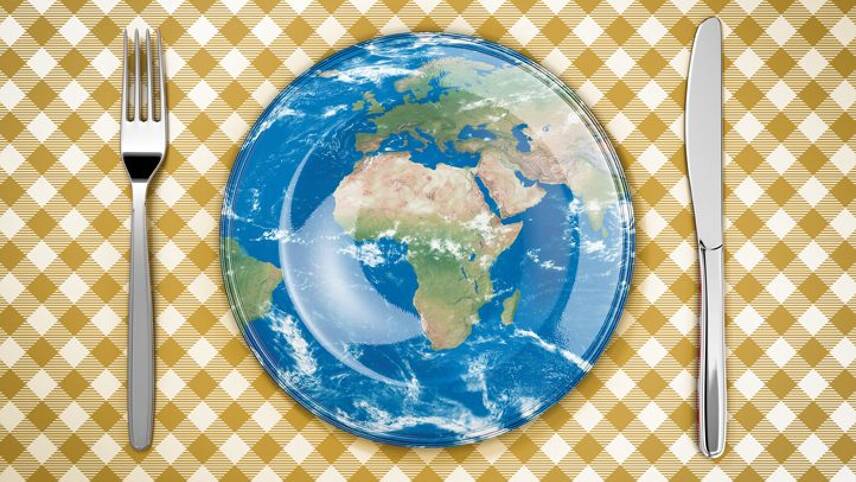Register for free and continue reading
Join our growing army of changemakers and get unlimited access to our premium content

The nation has also fallen head over heels in love with eating out. Brits now enjoy an incredible eight billion meals a year which they haven’t had to cook – whether it’s a Sunday roast in the local gastropub, brunch in a favourite café or a Michelin-starred dinner for a special occasion.
Has the revolution been bloody, velvet or green? In other words, has the gastronomic transformation been progressive or has sustainability been sacrificed on the altar of deliciousness?
How can we truly assess where the hospitality industry is in terms of sustainability and what really defines a ‘good’ restaurant?
Since its launch in 2010, the SRA has been working with an ever-growing group of businesses to ensure that, among other things, farmers both in the UK and further afield and the environment share in the benefits of the eating-out boom. While single issues rise and fall in media attention and consumer consciousness, the overall level of public awareness and interest is certainly on an upward curve.
Where once ‘food miles’ motivated both chefs and diners to seek out locally-grown or reared artisan products, now both groups are developing a more sophisticated understanding of this issue; built around deeper working relationships with a network of valued suppliers. However, the 2013 horsemeat scandal demonstrated that convoluted global supply chains do continue to prevent many in the business being able to claim true traceability.
At the beginning of the decade, food waste was seen in the sector as a dirty, difficult problem, best swept into a dark corner of the kitchen. Now, it’s starting to be viewed as a business opportunity with restaurants like Spring, Tiny Leaf and Real Junk Food Project feeding customers delicious, nutritious meals made from food that had been deemed surplus to requirements.
While WRAP’s recent announcement that signatories to the Hospitality and Food Service Agreement achieved an 11% reduction in food and associated packaging waste, levels of waste across the industry remain unacceptable, socially, environmentally and economically.
Food sourcing and food waste are just two of the ingredients that help determine what makes a good restaurant or food service business. The SRA now works with more than 6,000 sites across the UK, from high-street to high-end, office caterers to fish and chip shops. We think it’s time to turn up the volume and engage the whole industry in a conversation about what a ‘good’ restaurant or foodservice business really looks like and, importantly, provide a framework for measuring the progress of each operator as well as the sector.
With Rainforest Alliance’s Follow the Frog already in full flow and Fairtrade Fortnight at the end of the month, we’re kicking off a calendar of 10 campaigns across the rest of 2017, with a mission to make every coffee served in the UK GOOD. As the world’s second-most traded commodity, coffee is a brilliant bellwether for the sector. More than two billion cups are served every year and a quarter of coffee sold is now Fairtrade. But still there are farmers at the wrong end of the supply chain receiving only 1% of this black gold’s true value. And then there’s the land they’re farming…
It’s only a decade or so since Costa switched to using Rainforest Alliance-certified beans and AMT became the first UK café chain to go 100% Fairtrade. As the coffee industry has boomed, the search for speciality coffee that tastes great has, in a growing number of cases, been matched by a desire for a brew that does good too.
Our experience is that restaurants and foodservice businesses want a framework to follow when searching for greater sustainability. That’s why we’re slicing it up into bite-sized chunks across the year and, in the case of this month’s #coffeemadegood campaign, asking any business that serves coffee to come and join the conversation. With a host of certifications, relationship and direct trade models, it’s time for the industry to share its recipe for ‘good’ coffee, ensuring the farmers and their land share in the spoils of the revolution.
We want every foodservice provider in the UK to serve Good Coffee. Join the conversation #CoffeeMadeGood https://t.co/r4Ae5ZV5It pic.twitter.com/qQOGTkTPY8
— FoodMadeGood (@FoodMadeGood) February 1, 2017
Support Global Farmers is the first of 10 campaigns the SRA is running during 2017 to define what makes a ‘good’ restaurant or foodservice businesses.
Andrew Stephen is the chief executive of the Sustainable Restaurant Association




Please login or Register to leave a comment.